Wood Vinegar Impact on the Growth and Low-Temperature Tolerance of Rapeseed Seedlings
Abstract
1. Introduction
2. Materials and Methods
2.1. Test Site, Materials, and Soil Characteristics
2.2. Experimental Design
2.3. Morphological Indicators
2.4. Physiological Indicators
2.5. Data Processing and Analysis
3. Results
3.1. The Effect of Wood Vinegar on the Growth of Rapeseed Seedlings under Low-Temperature Stress
3.1.1. Biomass
3.1.2. Agronomic Traits
3.2. Effects of Wood Vinegar on Photosynthetic Characteristics and Stomatal Density of Rapeseed Seedlings under Low-Temperature Stress
3.2.1. Stomatal Density and Aperture
3.2.2. Photosynthetic Capacity and Water Use Efficiency
3.3. The Effect of Wood Vinegar on Osmotic Adjustment of Rapeseed Seedlings under Low-Temperature Stress
3.4. Effect of Wood Vinegar on Malondialdehyde and Antioxidant Enzyme Activities of Rapeseed Seedlings under Low-Temperature Stress
3.4.1. Malondialdehyde
3.4.2. Reactive Oxygen Species
3.4.3. Antioxidant Enzymes Activities
3.5. Effects of the Interaction of Low Temperature and Wood Vinegar on the Physiological Indexes of Rapeseed
4. Discussion
4.1. Wood Vinegar Can Promote the Growth of Rapeseed Seedlings under Low-Temperature Stress
4.2. Wood Vinegar Can Coordinate Low-Temperature Resistance and Photosynthesis by Significantly Increasing Stomatal Density and Reducing Stomatal Conductance
4.3. Wood Vinegar Mainly Enhances the Low-Temperature Resistance of Rapeseed by Greatly Increasing the Content of Proline
4.4. Wood Vinegar Can Greatly Increase the Activity of the SOD Enzyme to Enhance the Ability of Rapeseed to Resist Low Temperature
5. Conclusions
Author Contributions
Funding
Institutional Review Board Statement
Informed Consent Statement
Data Availability Statement
Acknowledgments
Conflicts of Interest
References
- Mungkunkamchao, T.; Kesmala, T.; Pimratch, S.; Toomsan, B.; Jothityangkoon, D. Wood vinegar and fermented bioextracts: Natural products to enhance growth and yield of tomato (Solanum lycopersicum L). Sci. Hortic. 2013, 154, 66–72. [Google Scholar] [CrossRef]
- Grewal, A.; Abbey, L.; Gunupuru, L.R. Production prospects and potential application of pyroligneous acid in agriculture. J. Anal. Appl. Pyrolysis. 2018, 135, 152–159. [Google Scholar] [CrossRef]
- Mohan, D.; Pittman, C.; Steele, P. Pyrolysis of wood/biomass for bio-oil: A critical review. Energy Fuels 2006, 20, 848–889. [Google Scholar] [CrossRef]
- Gu, S.; Zhu, K.; Geng, M.; Jiang, X.; Xu, Z.; Hu, L. The effect of foliar spraying of wood vinegar on the growth and development of rapeseed seedlings. Chin. J. Oil Crop Sci. 2020, 42, 453–460. [Google Scholar]
- Sun, R.; Cheng, G.; Li, Q.; He, Y.; Wang, Y.; Lan, Y.; Li, S.; Zhu, Y.; Song, W.; Zhang, X.; et al. Light-induced variation in phenolic compounds in cabernet sauvignon grapeseeds (Vitis vinifera L.) involves extensive transcriptome reprogramming of biosynthetic enzymes transcription factors and phytohormonal regulators. Front. Plant Sci. 2017, 8, 547. [Google Scholar] [CrossRef] [PubMed]
- Dissatian, A.; Sanitchon, J.; Pongdontri, P.; Jongrungklang, N.; Jothityangkoon, D. Potential of wood vinegar for enhancing seed germination of three upland rice varieties by suppressing malondialdehyde production. J. Agric. Sci. 2018, 40, 371–380. [Google Scholar]
- Kulkarni, M.G.; Ascough, G.D.; Staden, J.V. Effect of foliar applications of smoke-water and a smoke-isolated butenolide on seedling growth of okra and tomato. Hort Sci. 2007, 42, 179–182. [Google Scholar] [CrossRef]
- Wang, H.; Chen, L.; Ma, X.; Liu, X.; Zhang, Y.; Quan, X.; Shan, J.; Zhao, W. Effects of wood vinegar on cold resistance of rice seedlings under low-temperature stress. J. Northeast Agric. Univ. 2019, 50, 1–8. [Google Scholar]
- Miura, K.; Furumoto, T. Cold signaling and cold response in plants. Int. J. Mol. Sci. 2013, 14, 5312–5337. [Google Scholar] [CrossRef]
- Fiebelkorn, D.; Rahman, M.J. Development of a protocol for frost-tolerance evaluation in rapeseed/canola (Brassica napus L). Crop J. 2016, 4, 147–152. [Google Scholar] [CrossRef]
- D’Angeli, S.; Altamura, M.M. Unsaturated lipids change in olive tree drupe and seed during fruit development and in response to cold-stress and acclimation. Int. J. Mol. Sci. 2016, 17, 1889. [Google Scholar] [CrossRef]
- Khanna-Chopra, R.; Selote, D.S. Acclimation to drought stress generates oxidative stress tolerance in drought-resistant than -susceptible wheat cultivar under field conditions. Environ. Exp. Bot. 2007, 60, 276–283. [Google Scholar] [CrossRef]
- Abid, M.; Hakeem, A.; Shao, Y.; Liu, Y.; Zahoor, R.; Fan, Y.; Jiang, S.; Ata-Ul-Karim, S.T.; Tian, Z.; Jiang, D.; et al. Seed osmopriming invokes stress memory against post-germinative drought stress in wheat (Triticum aestivum L.). Environ. Exp. Bot. 2018, 145, 12–20. [Google Scholar] [CrossRef]
- Chen, K.; Arora, R. Understanding the cellular mechanism of recovery from freeze–thaw injury in spinach: Possible role of aquaporins heat shock proteins dehydrin and antioxidant system. Physiol. Plant 2014, 150, 374–387. [Google Scholar] [CrossRef]
- Noctor, G.; Reichheld, J.P.; Foyer, C.H. ROS-related redox regulation and signaling in plants. Semin. Cell Dev. Biol. 2018, 80, 3–12. [Google Scholar] [CrossRef]
- Kaplan, F.; Kopka, J.; Sung, D.Y.; Zhao, W.; Popp, M.; Porat, R.; Guy, C.L. Transcript and metabolite profiling during cold acclimation of Arabidopsis reveals an intricate relationship of cold-regulated gene expression with modifications in metabolite content. Plant J. 2007, 50, 967–981. [Google Scholar] [CrossRef]
- Sun, W.; Wu, J.; Fang, Y.; Liu, Q.; Yang, R.; Ma, W.; Li, X.; Zhang, J.; Zhang, P.; Lei, J. Growth and development characteristics of winter rapeseed northern extended from the cold and arid regions in china. Acta Agron. Sin. 2010, 36, 2124–2134. [Google Scholar] [CrossRef]
- Yin, Y.; Liao, X.; Yu, B.; Wang, H. Regional distribution evolvement and development tendency of chinese rapeseed production. Chin. J. Oil Crop Sci. 2010, 32, 147–151. [Google Scholar]
- Zhang, X.; Zhang, C.; Liao, X.; Wang, H. Investigation on 2008’low-temperature and freeze injure on winter rapeseed along Yangtze River. Chin. J. Crop Sci. 2008, 30, 122–126. [Google Scholar]
- Arnao, M.B.; Hernández-Ruiz, J. Melatonin: A new plant hormone and/or a plant master regulator. Trends Plant Sci. 2019, 24, 38–48. [Google Scholar] [CrossRef]
- Zhu, K.; Gu, S.; Liu, J.; Luo, T.; Khan, Z.; Zhang, K.; Hu, L. Wood vinegar as a complex growth regulator promotes the growth yield and quality of rapeseed. Agronomy 2021, 11, 510. [Google Scholar] [CrossRef]
- Li, C.; Tan, D.X.; Liang, D.; Chang, C.; Jia, D.; Ma, F. Melatonin mediates the regulation of ABA metabolism, free-radical scavenging, and stomatal behaviour in two Malus species under drought stress. J. Exp. Bot. 2015, 66, 669–680. [Google Scholar] [CrossRef]
- Liu, J.; Zhang, J.; Estavillo, G.M.; Luo, T.; Hu, L. Leaf N content regulates the speed of photosynthetic induction under fluctuating light among canola genotypes (Brassica napus L.). Physiol. Plant. 2021, 172, 1844–1852. [Google Scholar] [CrossRef]
- Bradford, M.M. A rapid and sensitive method for the quantitation of microgram quantities of protein utilizing the principle of protein-dye binding. Anal. Biochem. 1976, 72, 248–254. [Google Scholar] [CrossRef]
- Porra, R.J.; Thompson, W.A.; Kriedemann, P.E. Determination of accurate extinction coefficients and simultaneous equations for assaying chlorophylls a and b extracted with four different solvents: Verification of the concentration of chlorophyll standards by atomic absorption spectroscopy. Biochim. Biophys. Acta Bioenerg. 1989, 975, 384–394. [Google Scholar] [CrossRef]
- Zhou, W.; Leul, M. Uniconazole-induced alleviation of freezing injury in relation to changes in hormonal balance enzyme activities and lipid peroxidation in winter rapeseed. Plant Growth Regul. 1998, 26, 41–47. [Google Scholar] [CrossRef]
- Shan, D.; Huang, J.; Yang, Y.; Guo, Y.; Wu, C.; Yang, G.; Gao, Z.; Zheng, C. Cotton GhDREB1 increases plant tolerance to low-temperature and is negatively regulated by gibberellic acid. New Phytol. 2007, 176, 70–81. [Google Scholar] [CrossRef]
- Hodges, D.M.; DeLong, J.M.; Forney, C.F.; Prange, R.K. Improving the thiobarbituric acid-reactive-substances assay for estimating lipid peroxidation in plant tissues containing anthocyanin and other interfering compounds. Planta 1999, 207, 604–611. [Google Scholar] [CrossRef]
- Hwang, S.Y.; Lin, H.; Chern, R.H.; Lo, H.F.; Li, L. Reduced susceptibility to waterlogging together with high-light stress is related to increases in superoxide dismutase and catalase activities in sweet potato. Plant Growth Regul. 1999, 27, 167–172. [Google Scholar] [CrossRef]
- Demmig-Adams, B.; Stewart, J.J.; Baker, C.R.; Adams, W.W. Optimization of photosynthetic productivity in contrasting environment by regulons controlling plant form and function. Int. J. Mol. Sci. 2018, 19, 872. [Google Scholar] [CrossRef]
- Airaki, M.; Leterrier, M.; Mateos, R.M.; Valderrama, R.; Chaki, M.; Barroso, J.B.; Del Rio, L.A.; Palma, J.M.; Corpas, F.J. Metabolism of reactive oxygen species and reactive nitrogen species in pepper (Capsicum annuum L.) plants under low-temperature stress. Plant Cell Environ. 2012, 35, 281–295. [Google Scholar] [CrossRef]
- Yan, Y.; Lu, X.; Li, L.; Zheng, J.; Pan, G. The composition of straw pyrolysis wood vinegar and its effect on the growth and quality of pepper. J. Nanjing Agric. Univ. 2011, 5, 58–62. [Google Scholar]
- Zhai, M.; Shi, G.; Wang, Y.; Mao, G.; Wang, D.; Wang, Z. Chemical compositions and biological activities of pyroligneous acids from walnut shell. Bioresources 2015, 10, 1715–1729. [Google Scholar] [CrossRef]
- Xu, Z.; Zhou, G. Responses of leaf stomatal density to water status and its relationship with photosynthesis in a grass. J Exp Bot 2008, 59, 3317–3325. [Google Scholar] [CrossRef]
- Yang, C.; Xu, H.; Wang, L. Comparative effects of salt-stress and alkali-stress on the growth photosynthesis solute accumulation and ion balance of barley plants. Photosynthetica 2009, 47, 79–86. [Google Scholar] [CrossRef]
- Farquhar, G.D.; Sharkey, T.D. Stomatal conductance and photosynthesis. Annu. Rev. Plant Physiol. 1982, 33, 317–345. [Google Scholar] [CrossRef]
- Azymi, S.; Sofalian, O.; Jahanbakhsh, G.; Khomari, S. Effect of chilling stress on soluble protein sugar and proline accumulation in cotton (Gossypium hirsutum L) genotypes. Int. J. Agric. Crop Sci. 2012, 4, 825–830. [Google Scholar]
- Burbulis, N.; Jonytiene, V.; Kupriene, R.; Blinstrubiene, A. Changes in proline and soluble sugars content during cold acclimation of winter rapeseed-seed shoots in vitro. J. Food Agric. Environ. 2011, 9, 371–374. [Google Scholar]
- Ashraf, M.; Foolad, M.R. Roles of glycine betaine and proline in improving plant abiotic stress resistance. Environ. Exp. Bot. 2007, 59, 206–216. [Google Scholar] [CrossRef]
- Srinivas, V.; Balasubramanian, D. Proline is a protein-compatible hydrotrope. Langmuir 1995, 11, 2830–2833. [Google Scholar] [CrossRef]
- Thomashow, M.F. Plant cold acclimation: Freezing tolerance genes and regulatory mechanisms. Annu. Rev. Plant Biol. 1999, 50, 571–599. [Google Scholar] [CrossRef]
- Zhang, Y.; Wang, X.; Liu, B.; Liu, Q.; Zheng, H.; You, X.; Sun, K.; Luo, X.; Li, F. Comparative study of individual and Co-Application of biochar and wood vinegar on blueberry fruit yield and nutritional quality. Chemosphere 2020, 246, 125699. [Google Scholar] [CrossRef]
- Ruelland, E.; Vaultier, M.N.; Zachowski, A.; Hurry, V. Cold signalling and cold acclimation in plants. Adv. Bot. Res. 2009, 49, 35–150. [Google Scholar]
- Bi, H.; Liu, P.; Jiang, Z.; Ai, X. Overexpression of the rubisco activase gene improves growth and low temperature and weak light tolerance in Cucumis sativus. Physiol. Plant 2017, 161, 224–234. [Google Scholar] [CrossRef] [PubMed]
- Latef, A.A.H.A.; He, C. Arbuscular mycorrhizal influence on growth photosynthetic pigments osmotic adjustment and oxidative stress in tomato plants subjected to low-temperature stress. Acta Physiol. Plant. 2011, 33, 1217–1225. [Google Scholar] [CrossRef]
- Anjum, S.A.; Farooq, M.; Xie, X.; Liu, X.; Ijaz, M.F. Antioxidant defense system and proline accumulation enables hot pepper to perform better under drought. Sci. Hortic. 2012, 140, 66–73. [Google Scholar] [CrossRef]
- Wei, Q.; Ma, X.; Zhao, Z.; Zhang, S.; Liu, S. Antioxidant activities and chemical profiles of pyroligneous acids from walnut shell. J. Anal. Appl. Pyrolysis. 2010, 88, 149–154. [Google Scholar] [CrossRef]
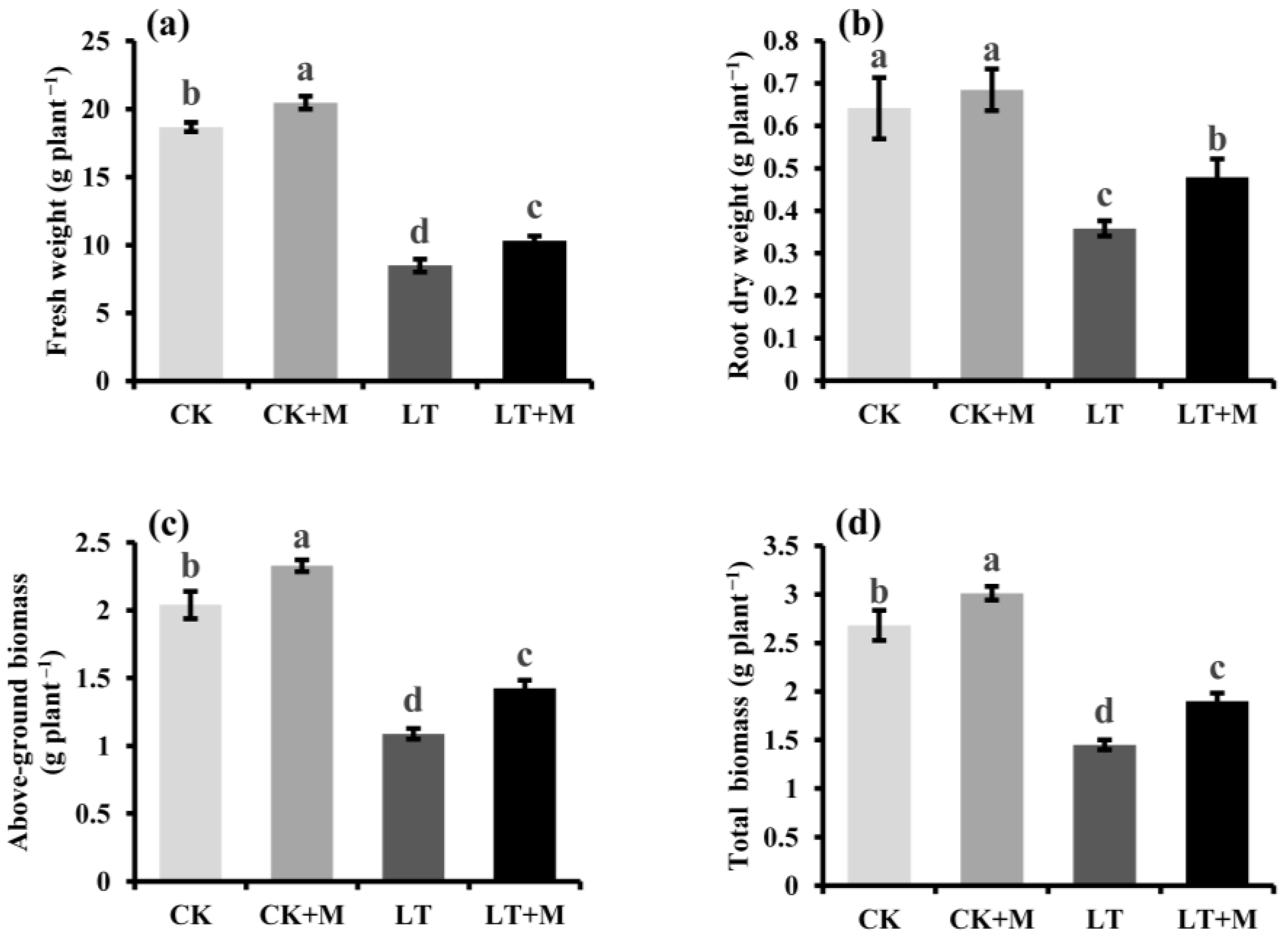
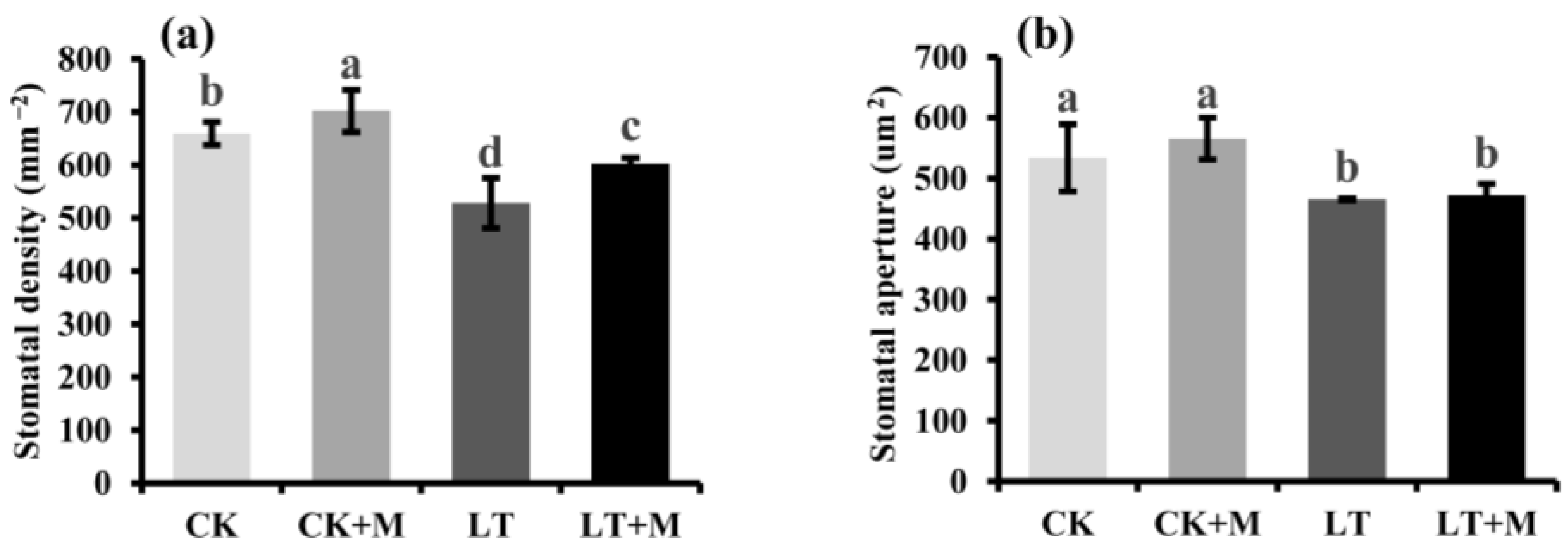
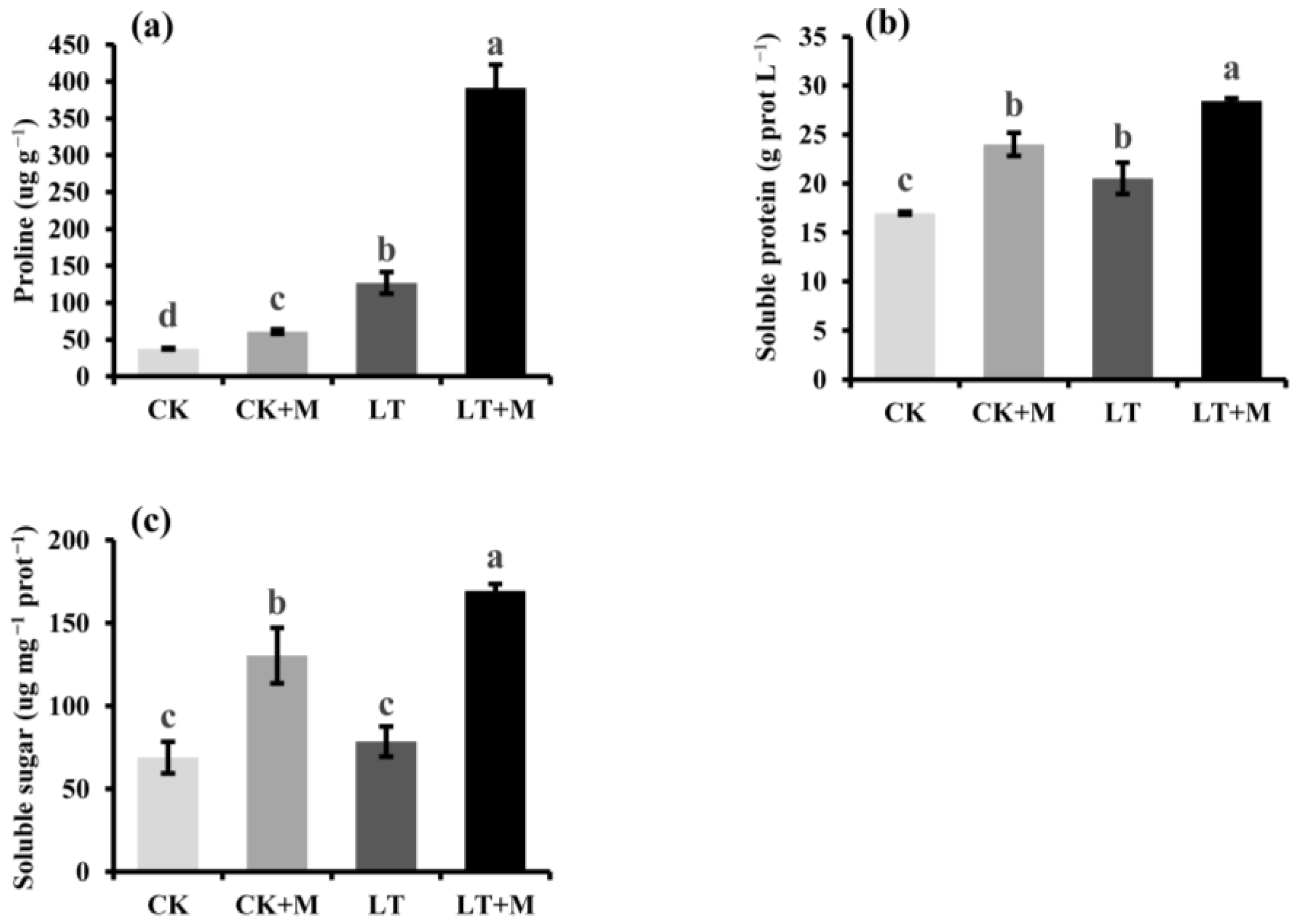
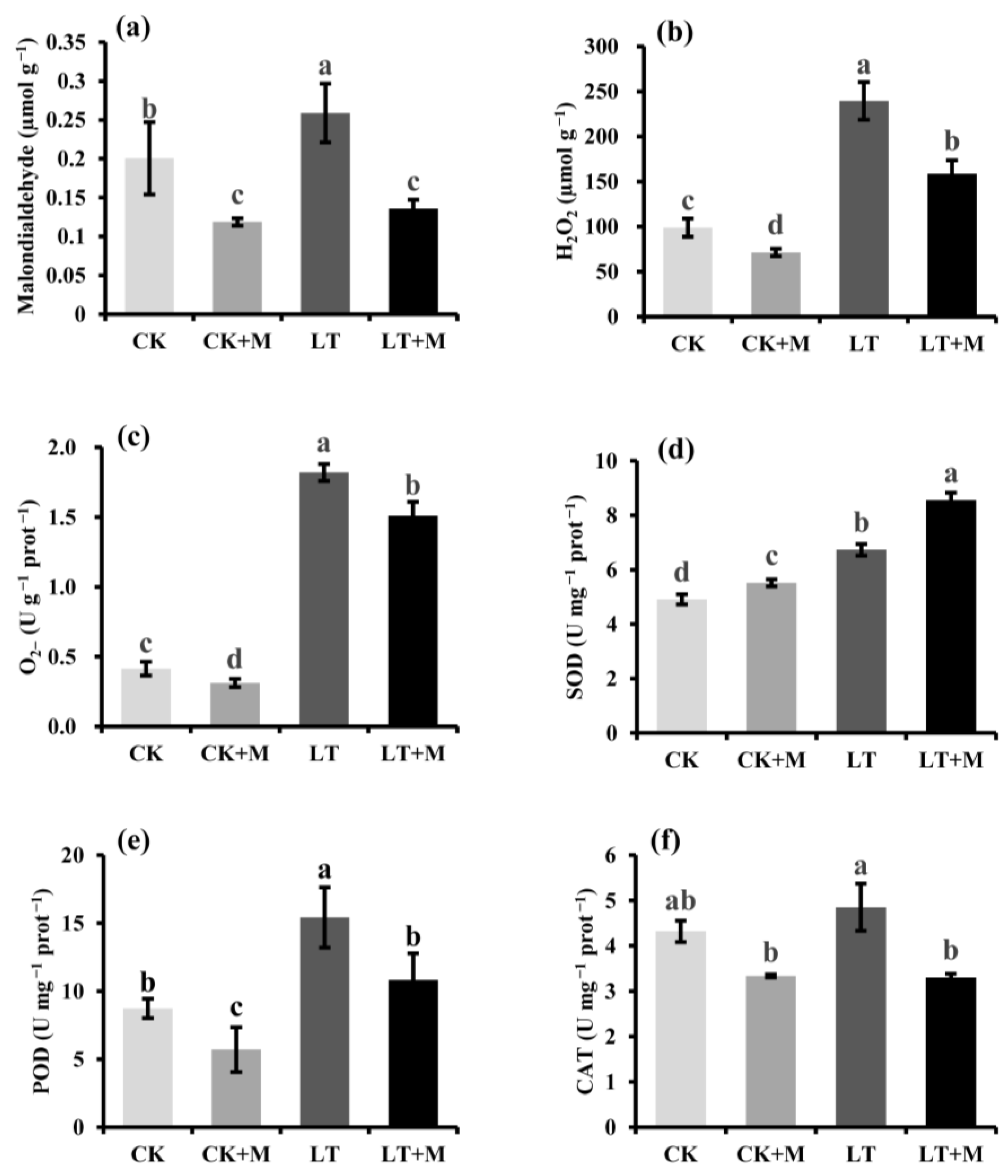
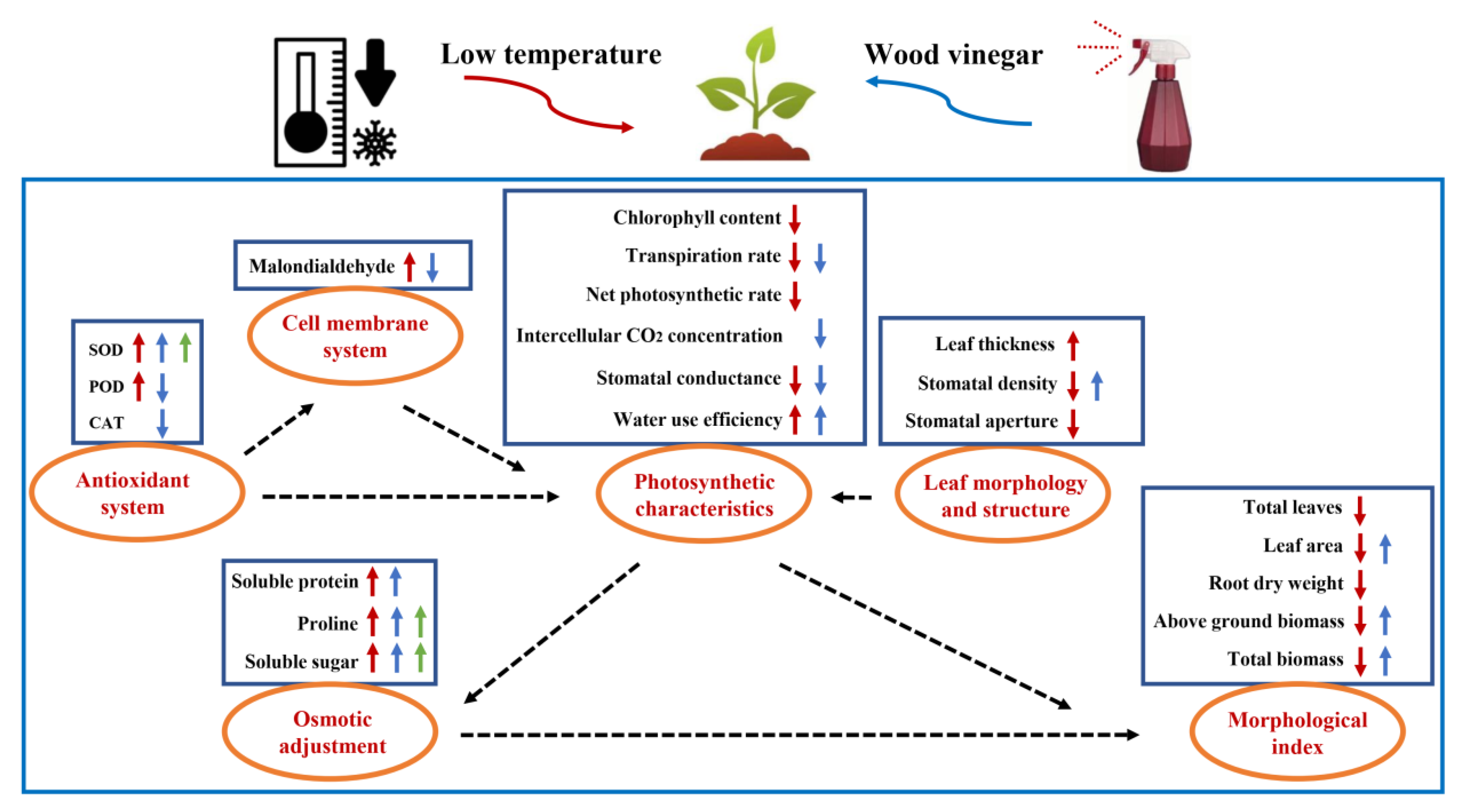
| Treatment | Number of Total Leaves | Number of Green Leaves | Leaf Area (cm2) | Leaf Thickness (mm) |
|---|---|---|---|---|
| CK | 7.5 ± 0.2 a | 5.7 ± 0.3 a | 2833 ± 78 b | 0.31 ± 0.01 b |
| CK + M | 8.0 ± 0.3 a | 6.0 ± 0.2 a | 3221 ± 110 a | 0.32 ± 0.01 b |
| LT | 4.0 ± 0.0 b | 3.0 ± 0.0 b | 687 ± 56 d | 0.62 ± 0.03 a |
| LT + M | 4.2 ± 0.2 b | 3.2 ± 0.2 b | 836 ± 19 c | 0.63 ± 0.02 a |
| Treatment | Chlorophyll Content (mg/g) | Transpiration Rate (mmol m−2 s−1) | Net Photosynthetic Rate (µmol m−2 s−1) | Intercellular CO2 Concentratio (µmol mol−1) | Stomatal Conductance (mol m−2 s−1) | Water Use Efficiency (µmol mol−1) |
|---|---|---|---|---|---|---|
| CK | 1.5 ± 0.1 a | 13.0 ± 0.6 a | 25.8 ± 1.0 a | 326 ± 8 ab | 1.5 ± 0.2 a | 1.72 ± 0.09 c |
| CK + M | 1.5 ± 0.1 a | 11.6 ± 0.5 b | 25.9 ± 0.9 a | 322 ± 7 bc | 1.3 ± 0.2 a | 1.99 ± 0.07 b |
| LT | 1.0 ± 0.1 b | 4.9 ± 0.6 c | 17.7 ± 0.8 b | 339 ± 9 a | 0.9 ± 0.1 b | 1.96 ± 0.06 b |
| LT + M | 1.2 ± 0.1 b | 3.8 ± 0.5 c | 18.2 ± 0.5 b | 312 ± 4 c | 0.6 ± 0.0 c | 3.03 ± 0.12 a |
| Physiological Indexes | Low Temperature | Wood Vinegar | Low-Temperature × Wood Vinegar |
|---|---|---|---|
| Proline | ** | ** | ** |
| Soluble sugar | * | ** | ** |
| SOD | ** | ** | * |
Publisher’s Note: MDPI stays neutral with regard to jurisdictional claims in published maps and institutional affiliations. |
© 2022 by the authors. Licensee MDPI, Basel, Switzerland. This article is an open access article distributed under the terms and conditions of the Creative Commons Attribution (CC BY) license (https://creativecommons.org/licenses/by/4.0/).
Share and Cite
Zhu, K.; Liu, J.; Luo, T.; Zhang, K.; Khan, Z.; Zhou, Y.; Cheng, T.; Yuan, B.; Peng, X.; Hu, L. Wood Vinegar Impact on the Growth and Low-Temperature Tolerance of Rapeseed Seedlings. Agronomy 2022, 12, 2453. https://doi.org/10.3390/agronomy12102453
Zhu K, Liu J, Luo T, Zhang K, Khan Z, Zhou Y, Cheng T, Yuan B, Peng X, Hu L. Wood Vinegar Impact on the Growth and Low-Temperature Tolerance of Rapeseed Seedlings. Agronomy. 2022; 12(10):2453. https://doi.org/10.3390/agronomy12102453
Chicago/Turabian StyleZhu, Kunmiao, Jiahuan Liu, Tao Luo, Kangkang Zhang, Zaid Khan, Yu Zhou, Tai Cheng, Baozhong Yuan, Xitian Peng, and Liyong Hu. 2022. "Wood Vinegar Impact on the Growth and Low-Temperature Tolerance of Rapeseed Seedlings" Agronomy 12, no. 10: 2453. https://doi.org/10.3390/agronomy12102453
APA StyleZhu, K., Liu, J., Luo, T., Zhang, K., Khan, Z., Zhou, Y., Cheng, T., Yuan, B., Peng, X., & Hu, L. (2022). Wood Vinegar Impact on the Growth and Low-Temperature Tolerance of Rapeseed Seedlings. Agronomy, 12(10), 2453. https://doi.org/10.3390/agronomy12102453








